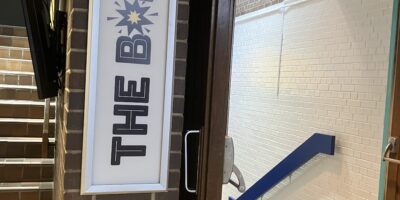University Clubs holds an important place in Waterloo’s learning community be it academic, sports, performance arts, fine arts, recreational, etc. Being part of a club helps you gain knowledge from your own experiences and by collaborating with other students as well. So, if you’re in search of a club that will help you improve your programming and design thinking skills, we have a new addition called the Developer Students Club (DSC) for all you avid coders.
This club is an initiative by Google to encourage students to learn Google’s Open Source Tools. In order to better understand how this club works and share it with anyone interested in joining, I interviewed Shubhangi Raj, the Director of Workshops of the DSC. Shubhi is a 2nd year Software Engineering student with a keen interest in Computer Vision.
Q: Can you give me a brief overview of the DSC Club?
A: The Developer Students Club is a university-based group that encourages undergraduate as well as graduate students to build with Google Developer technologies. We help them grow in peer-to-peer learning and build solutions from open source tools. It’s not affiliated with WUSA but it’s a chain of clubs established by Google in the universities, globally.
Q: What kind of club is it? Is it similar to a student design team or just a gathering of students interested in learning about Google’s Open Source tools?
A: Unlike design teams that represent the University, the DSC is not really associated with UWaterloo but it’s based in our community, since It’s a great place to encourage students at an early stage, to learn Google’s technologies and build with them.
Q: Is this club open to programmers of all levels?
A: It’s definitely open to programmers of any level because we want to introduce the technology to students. We’re interested in helping those who want to get started, equally compared to someone who already has knowledge and wants to learn more about these tools in depth.
Q: And what can we learn from building with these open source technologies?
A: You can learn about cloud, machine learning, mobile technologies and everything Google has to offer.
Q: When did you join and how are you finding it so far?
A: So the DSC has already been established in other universities and it was recently introduced to our university, so I joined this term. I feel it’s an amazing opportunity, especially having the Google office in Waterloo. It can help us learn from the Google community and as an executive of the club, I can help others, organize workshops and learn new technologies myself as well. It’s a great place to meet new and experienced people. We have a pretty good backing by Google and they provide funding for the workshops and activities held by the club.
Q: How would you define the structure of the club?
A: Google selects one of the students as a DSC Lead through an application process that takes place every year, around September to October. The lead is responsible for setting up the club in the university, hosting workshops and building activities and helping people learn. The executive committee is set up after the Lead is chosen, so responsibilities are divided. It is a fairly new club and we’re an executive team of 6 and are looking for students to join our mailing list to expand our club.
The executive team consists of a Director of Workshops, Marketing Director, Finance Director, Project Lead, and the Core Developers. The Director of Workshops is responsible for ensuring the club is running actively and workshops are held at correct intervals of time, organizing tutorials for new technologies and advanced learning sessions, based on the project’s requirements. The Marketing Director is responsible for the marketing strategy, especially in this early phase. We need to communicate to students what we’re trying to achieve and how beneficial it is to them. The Finance Director is responsible for the funds provided for certain events. Since the main purpose of the club is to help open source contributions, we will be having projects throughout the year. So, the project lead will be responsible for selecting and facilitating the projects. The Core Developers will help with the development process along with other members who would like to join the club.
Q: How do y’all select projects to work on? And is the plan to make everyone work on the same project or multiple projects?
A: We have a lot of autonomy. So we can make the decisions on how we want to structure the projects throughout the year. In the beginning, we will start with a lesser number of projects, but as we’re heading different departments, we have the autonomy to build a more intense network of teams under us. So, if we feel the projects are becoming too detailed, we can eventually set up different pillars of streams. So, we can have a mobile project and a machine learning project at the same time. But we’re still a new club so we don’t have projects lined up yet since we’re still looking for people to join.
Q: Does anyone from Google oversee the projects? How involved are they with the club?
A: They aren’t going to keep an eye on the projects but they help us organize certain sessions such as study jams. One of the major requirements is that the project has to be
open-sourced.
Q: What’s the process like when a project is finished and when a goal has been achieved?
A: We’re independent from Google as a company. They have certain people in Google who a
re responsible for ensuring the clubs are functioning properly and doing what they need to but it’s more about encouraging a community so they can grow and learn together as developers.
The goal of the club is to have an innovative approach towards learning Google technologies and building open sourced projects and facilitating a peer to peer learning community.
Q: Does being a member of the club help students applying for Google jobs?
A: So it definitely helps in a lot of ways. You don’t need to know all of Google’s tools but it would help you know what team you want to work in based on what technologies you’ve worked on. And Google would appreciate the fact that you put in an effort into building open sourced technologies and it can give you an edge when applying.
Q: Would you say executives have a good networking opportunity since they coordinate with Google employees?
A: Definitely, and not only the executives but the club members as well, especially with the lineup of events. We have an upcoming event on November 14th, “Cracking the Technical interview”. We have a Google Software Engineer, who is also a Waterloo alumnus, coming in to talk about techniques you can use the crack the interview for any company. This will give students an opportunity to network.
Google also holds a DSC Lead summit where all the DSC leads from universities meet, network and see what other universities are implementing, learn from them and exchange knowledge. It’s a great leadership opportunity.
Q: These sessions that you hold for students? Does google ask you to hold these sessions or does the club decide them?
A: There are some standard events that google asks us to host such as the cracking the coding interview. They encourage us to incorporate these events as part of the club. There’s also a study jam coming up in December, which will be a 3-4 hour session and as a club, we can choose certain streams such a Kubernetes, IoT, ML, etc. Apart from that, it’s our responsibility as a club and as independent decision makers to decide what we want to do throughout the year, so that the club remains active and there’s something new and exciting happening every time.
Q: Are these events open only to DSC members or other students as well?
A: Every student is welcome and we encourage students with any background to attend these events and take full advantage of them.
Q: And how are y’all planning on communicating to students who are not part of the club about these events?
A: So that’s how we’ve started. There was no one on the mailing list since we started from scratch. We’ve posted on different Facebook groups and taken the approach of talking to 1st to 3rd years directly. We’ve even gone to classes and advertised and set up flyers. We talk to them about the advantages of joining the club and the events.
Q: Is there anything else you would like our readers to know?
A: To summarize, it’s an amazing opportunity to take advantage of, now that it’s in the university and accessible to everyone. We encourage you to contact the execs if you have any questions. We’re ready to help anytime. You can find us on LinkedIn and we even have a DSC Facebook page so you can keep track of events hosted by us.
Check out these websites for more information on the DSC Club and upcoming events –
Google DSC: https://developers.google.com/community/dsc
DSC Uwaterloo: https://dscuwaterloo.github.io/
DSC Uwaterloo FB Page: https://www.facebook.com/dscuwaterloo/




Leave a Reply